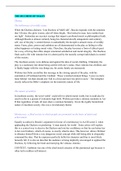THE DUCHESS OF MALFI
Themes
The hollowness of worldly status:
When the Duchess declares ‘I am Duchess of Malfi still’, Bosola responds with the sententia
that ‘Glories, like glow worms, afar off shine bright, / But looked to near, have neither heat
nor light’. Sententiae are succinct sayings that impart a profound moral or philosophical truth.
Although Bosola is almost certainly being his characteristically antagonistic and contrary
self, one of the play’s central themes is undoubtedly the deceptive attractiveness of worldly
status. Fame, glory, power and ambition are all demonstrated in the play as failing to offer
either happiness or lasting moral value. Therefore, the play becomes a form of ethical quest
for a way of living that offers deeper emotional satisfaction and moral integrity. The Duchess
finds such a life with Antonio but it is destroyed by the morally corrupt individuals in control
of this society.
The Jacobean society were dubious and against the idea of social climbing. Ultimately the
play is a cautionary tale about being careful with one’s status. Once Antonio has climbed, and
is finally happy with the way things are, his entire family are massacred.
Webster has Delio crystallise this message in the closing speech of the play, with his
summation of Ferdinand and the Cardinal: ‘These wretched eminent things / Leave no more
fame behind ‘em than should one/ Fall in a frost and leave his print in snow’. The metaphor
clearly reflects the Bible’s emphasis on the transitory nature of life.
The nature of nobility:
In Jacobean society, the word ‘noble’ could refer to inherit moral worth, but it could also be
used to refer to a person of extremely high birth. Webster provides a salutary reminder in Act
II that regardless of rank, all men share a common humanity. Given the rigidly hierarchical
nature of Jacobean society, this was a revolutionary theme.
Meritocracy: a fluid society in which people are promoted on the basis of talent and
achievement
Equally as radical is Bosola’s argument in favour of a meritocracy in Act III scene 2, when
applauding the Duchess on preferring ‘A man merely for worth’. Some critics will explain
this is a cynical way to deceive the Duchess and win her confidence so that he can betray her
to her own brothers- which of course, is exactly what he does. This however, allows Webster
to distance himself from a very dangerous social concept while still being able to eloquently
command the idea. That he expresses perfectly befits his character and thus is most likely
honestly felt. It is also an idea that the audience is being implicitly encouraged to applaud the
Duchess, by following her heart and marrying the virtuous Antonio.
CONTEXT: Ambition was one of the chief moral concerns of this puritanical age because it
often led to ruthless self-interest.
, CONTEXT: using a conversational format in which fictional characters exchange opposing
points of view was a common device at this time for presenting radical and potentially
dangerous ideas.
Ambition:
Despite all the indications that Webster may have favoured a meritocracy there is a
problematic ambiguity. Having very possibly trained as a lawyer, Webster may have done
this intentionally, as it would allow him wiggle-room should he fall foul of the state censor.
Consequently, ambition is also portrayed as something that is dangerous to both self and
society.
Social inequality:
This social mismatch between the Duchess and Antonio is referred to on a number of
occasions throughout the play. Initially, the theme is introduced by the Duchess’ delicate
courting of Antonio. Being a spiritual person herself, she is attracted to Antonio’s virtue
rather than his social status: ‘This goodly roof of yours is well built’. Most other characters
who comment on the match after their relationship becomes public, however, merely reflect
the prejudices of the time. Bosola, although he continually rails against a system that denies
him the status he believes he deserves.
Corruption and sycophancy:
Through the prism of the Italian court settings and one hundred years of history Webster is
able to allude to the well-known misconduct in James I court. Webster presents a world of
sycophants desperate to advance their own position, regardless of the consequences to others.
Again, it is Bosola’s pithy prose that crystallises the theme ‘places in the court are but like
beds in the hospital, where this man’s head lied at that man’s foot, and so lower and lower’.
This simile conjures up an impression of a sick society in which courtiers eagerly await the
opportunity to benefit from the deaths or misfortunes of those above them. Thus Bosola’s
dark comparison extends the vision initially set out by Antonio’s sententia in the play’s
opening ‘but if’t chance/ Some cursed example poison’t near the head,/ Death and diseases
through the whole land spread’
CONTEXT: in 1610, Robert Carr persuaded King James to dissolve Parliament because of its
desire to regulate the royal finances, something that would have personally affected Carr’s
ability to continue to acquire wealth from James I.
Flattery:
Inextricably interwoven the above is the equally important theme of flattery, a well-known
strategy employed by King James I’s favourites in order to advance their position in the
Jacobean court- despite their frequent lack of ability or good moral character. In Act III scene




